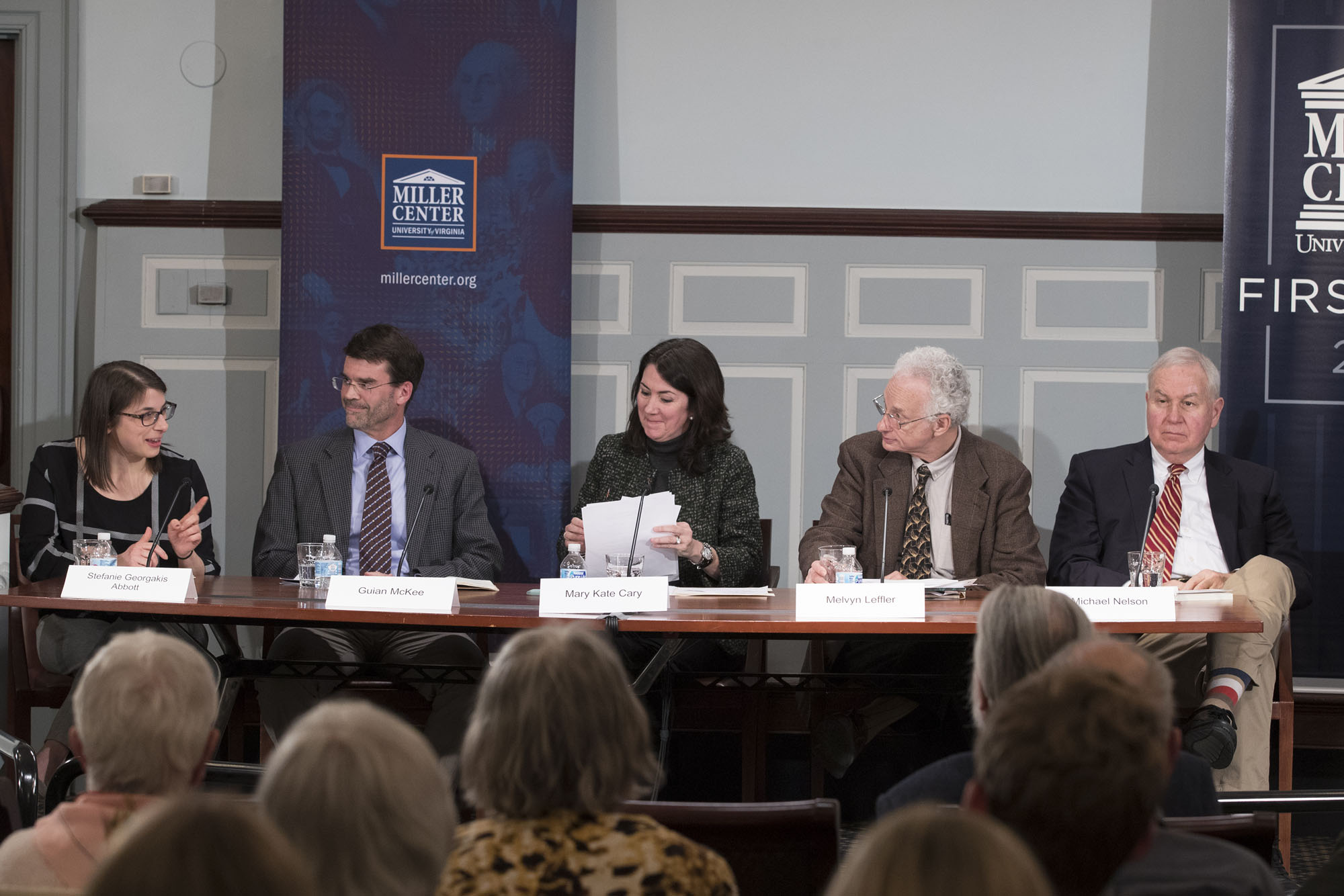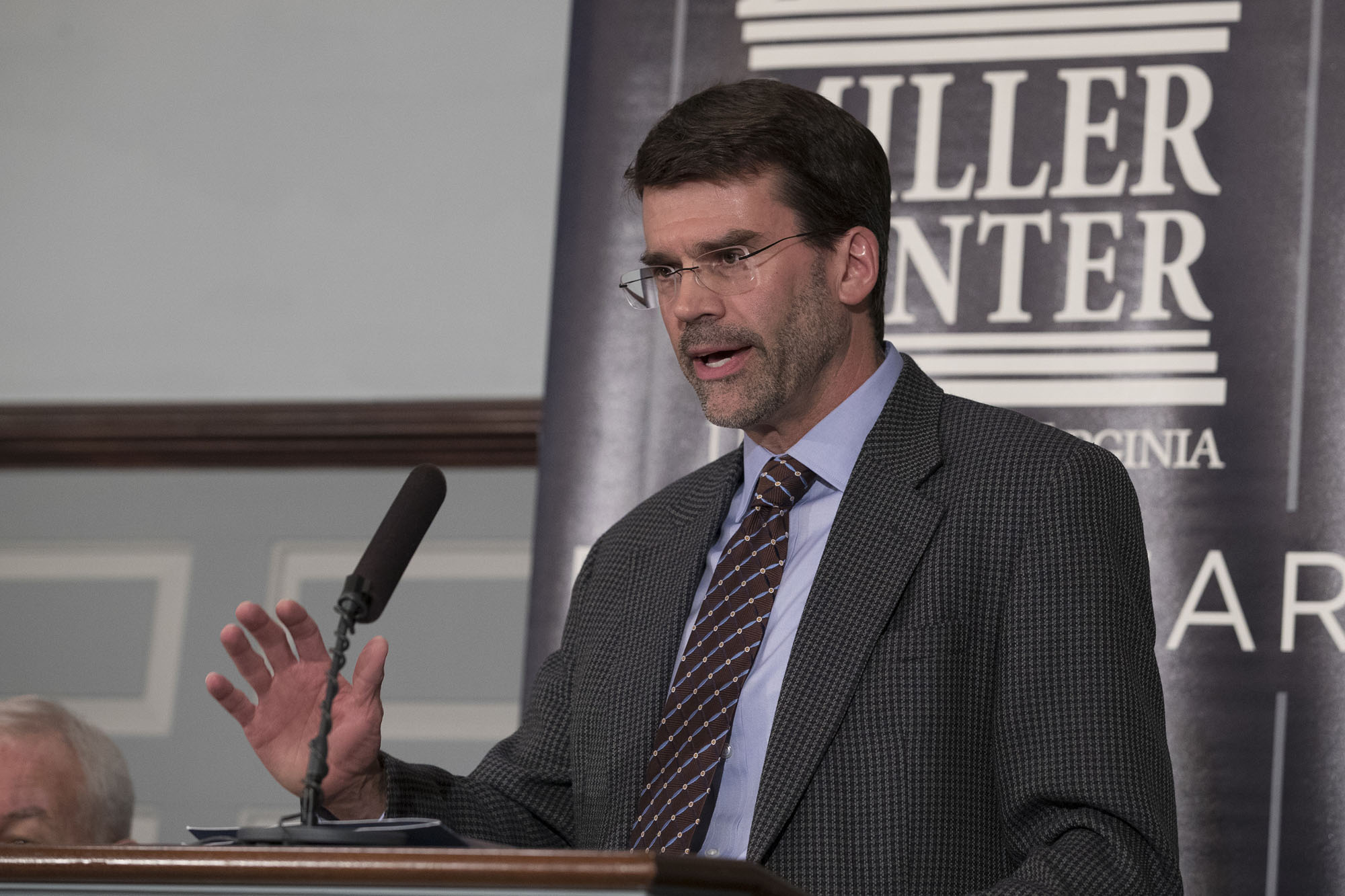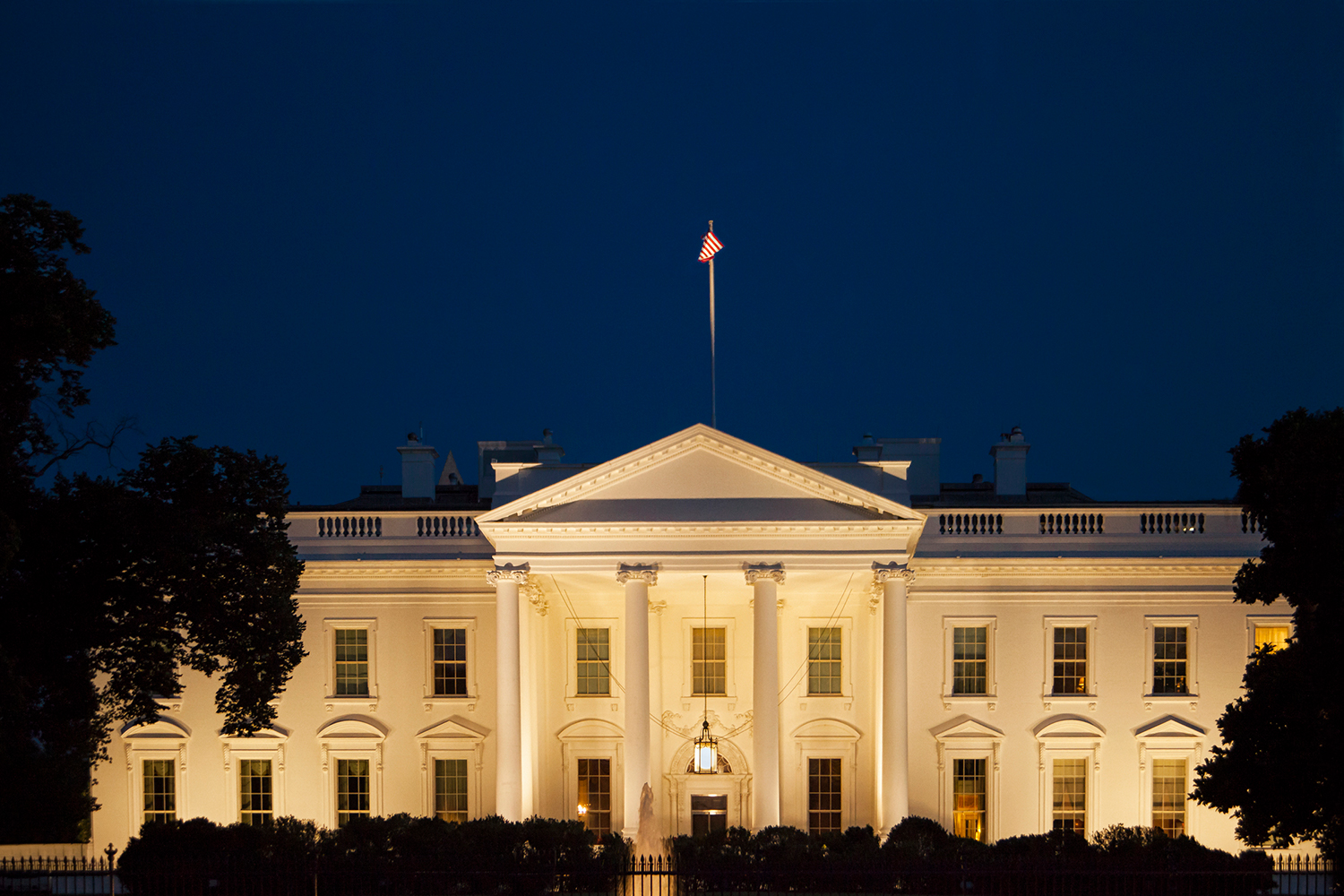The University of Virginia’s Miller Center has spent more than two years analyzing how American presidents have performed during their first year in office. On Thursday, scholars focused that analysis on President Donald Trump.
Trump’s first year in office has come with its own milieu of crises and challenges, some of them unique to Trump; others stemming from debates that have long echoed through the halls of American government.
The Miller Center’s First Year Project, launched in October 2015, provides historical context and analysis of the challenges facing current and previous administrations, based upon research from numerous scholars and the center’s own remarkable archives, which include oral histories for every administration since Jimmy Carter and more than 4,000 hours of Oval Office recordings.

From left to right, moderator Stefanie Georgakis Abbott and panelists Guian McKee, Mary Kate Cary, Melvyn Leffler and Michael Nelson. (Photo by Dan Addison, University Communications)
“What we wanted to do, on domestic and foreign policy issues, was to think through, systematically, how a president does the job during the first year,” Miller Center Director William J. Antholis said. “How do they appoint their Cabinet? How do they establish those processes that make an administration work? How do they identify their priorities and move forward on those priorities?”
Overseen by a bipartisan advisory board that includes top officials from the Reagan, Bush, Clinton and Obama administrations, the First Year Project is part historical analysis, part guidance for current and future administrations. It includes almost 60 essays by scholars from UVA and other top universities and 14 senior officials from previous Republican and Democratic administrations, on topics ranging from immigration and infrastructure to foreign policy or managing a bureaucracy. The information, in addition to being made public, was presented to presidential candidates’ teams during the 2016 campaign and to Trump’s transition team.
On Thursday, a panel of four Miller Center scholars gathered to analyze the past 365 days of the American presidency and celebrate the release of the project’s book, “Crucible: The President’s First Year,” published by UVA Press.
The panel included Michael Nelson, a professor of political science at Rhodes College and nonresident senior fellow at the Miller Center; Guian McKee, an associate professor of presidential studies at the Miller Center; Mary Kate Cary, a Miller Center senior fellow and former speechwriter for President George H.W. Bush; and Melvyn Leffler, the Edward R. Stettinius Jr. Professor in UVA’s history department.
Here’s what they had to say about Trump’s first year in office:
Michael Nelson: The America Trump Inherited
Nelson, who recently published a book on the current president, “Trump’s First Year,” through UVA Press, set the stage by reflecting on the state of the nation when Trump took office.
“Donald Trump was dealt a very good hand,” despite the dire picture he painted in his inaugural address, Nelson said, citing the recovering economy and the Republican majorities in Congress as examples.
However, he pointed out that trust in the federal government has continued to decline since the Vietnam War. Former President Jimmy Carter – who ran as a governor with little experience in Washington, D.C. – campaigned in 1976 on his appeal as an “outsider” candidate at a time when the public did not trust Washington. Several other governors, including former presidents Ronald Reagan, Bill Clinton and George W. Bush, followed suit.
It makes sense that the next iteration of that trend, Nelson said, would be someone with little governing experience.
“Donald Trump did not just drop out of the sky,” he said. “There has been a long-term, almost three-quarters-of-a-century-long trend, of which he is the most recent manifestation.”
Nelson expressed concern that, outside of his core supporters, Trump was doing little to shore up trust in government. He cited several misstatements that he said reflected the president’s ignorance of governing norms, his continued status as an outsider in Washington and his tendency to use social media to divide rather than unite.
“It’s extremely effective in solidifying the base of support he already has, but not so much, or not at all, in expanding his support,” Nelson said.
Melvyn Leffler: Foreign Policy in Year One
Leffler addressed foreign policy and national security issues in Trump’s first year.
Though many presidents have faced major tragedies during their first year in office – Sept. 11, 2001 fell in George W. Bush’s first year, for example – Leffler said that Trump has not yet faced a similar test.
“There has been no Bay of Pigs, no 9/11,” he said.
He noted that the Trump administration could count the fall of ISIS in Syria and Iraq as “one unequivocal success in foreign policy.”
“That is a really noteworthy accomplishment, which was already underway in Obama’s last years, but which the military under Trump has succeeded in accomplishing,” he said.
However, he also listed several failures that he was concerned about as a scholar and historian of foreign policy.
“He has neither improved relations with Russia, which he had stated he wanted to do, nor constrained Russian actions in Ukraine or Syria, nor confronted Putin over electoral intervention here and in Europe,” Leffler said. “President Trump, for all his rhetoric, has not stopped North Korea’s strategic advances, has made no progress in containing the projection of Chinese military strength into the South China Sea, and has done very little to contain the expansion of Chinese influence elsewhere.”
Among other concerns, Leffler also worried that Trump’s “America First” policy could reduce the policies of international cooperation that have kept the peace in many ways after World War II.
“These were the policies that bred peace among the great powers for the last 75 years,” Leffler said. “These were the policies that brought more people out of poverty in the last 40 years than in any comparable era in world history. Those were the things that made America great.”
Guian McKee: Concern on the Home Front
McKee took the mic to address domestic policy under the Trump administration.
Among the accomplishments of Trump’s first year, he said that the president has been notably successful in appointing federal judges, including the appointment of Neil Gorsuch to the Supreme Court.
“Here, his role has clearly been quite significant,” McKee said.
However, McKee believes Trump missed a key opportunity when he deferred to Congressional interests and chose to pursue a repeal of the Affordable Care Act before focusing on infrastructure improvements that he had touted during his campaign.

Associate professor of presidential studies Guian McKee addressed domestic policy in President Trump's first year.
“I see this as a critical first-year mistake, because it shifted the administration’s focus permanently away from a substantive way to meet the needs of its core voters,” McKee said. “Infrastructure is the key. It would have been popular. It would have made Trump seem like the strong, vigorous, can-do president that he claimed on the campaign trial he would be and it would show he was following through on his promise to help those left behind by traditional politics.”
McKee expressed concern that such choices are compounding feelings of alienation and division among voters, rather than expanding them.
“The result is a base that remains mostly loyal and angry, but also a determined, motivated and I think, very likely permanent opposition,” he said. “And perhaps most notably, the political mobilization of women,” that could significantly impact the 2018 midterm elections.
Mary Kate Cary: Lessons in Communications Strategy
Cary, who was a speechwriter in the George H.W. Bush administration, focused her remarks on the current administration’s communications strategies.
She noted that Trump’s press team has offered more seats in the press room than the Obama administration did and has also provided “Skype seats” for local media to attend remotely.
“I believe this is very smart, because more and more Americans are turning to local media as a more trusted news source,” Cary said.
She also cited several statistics showing that more and more Americans and people around the world are getting their news online – nearly as many as are getting it on television.
“There is a tremendous opportunity in the coming year for President Trump to use his global reach on Twitter and reach more people in other countries,” she said.
The key, of course, is the content of those tweets. Right now, Cary said, only about 26 percent of Americans polled believed that the president’s use of Twitter was appropriate.
“If he were to change the tone of his tweets, he could do tremendous good in terms of America’s reputation abroad,” she said. “This coming year, given these numbers [of the president’s social media reach], holds tremendous opportunity for him if he chooses to take it.”
Media Contact
Article Information
January 25, 2018
/content/miller-center-scholars-analyze-trumps-first-year

